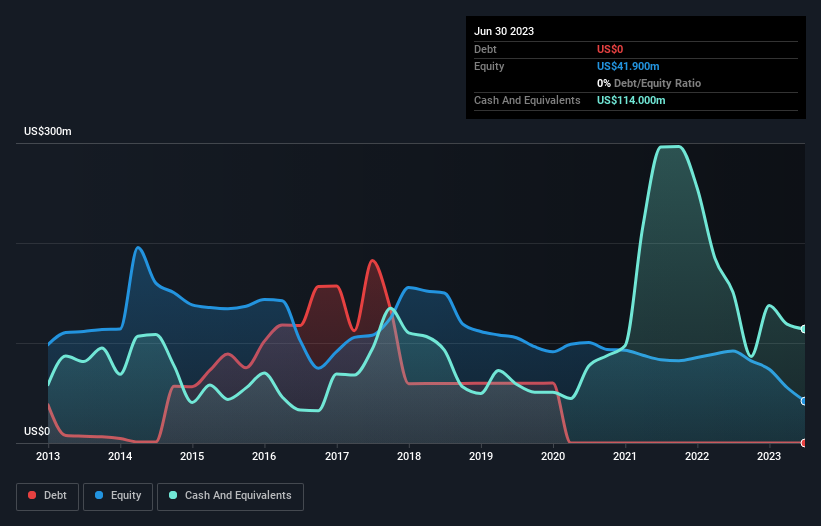We Think Philly Shipyard (OB:PHLY) Can Afford To Drive Business Growth

Even when a business is losing money, it's possible for shareholders to make money if they buy a good business at the right price. For example, although Amazon.com made losses for many years after listing, if you had bought and held the shares since 1999, you would have made a fortune. But the harsh reality is that very many loss making companies burn through all their cash and go bankrupt.
So should Philly Shipyard (OB:PHLY) shareholders be worried about its cash burn? In this article, we define cash burn as its annual (negative) free cash flow, which is the amount of money a company spends each year to fund its growth. The first step is to compare its cash burn with its cash reserves, to give us its 'cash runway'.
View our latest analysis for Philly Shipyard
How Long Is Philly Shipyard's Cash Runway?
A cash runway is defined as the length of time it would take a company to run out of money if it kept spending at its current rate of cash burn. When Philly Shipyard last reported its balance sheet in June 2023, it had zero debt and cash worth US$114m. In the last year, its cash burn was US$37m. So it had a cash runway of about 3.1 years from June 2023. A runway of this length affords the company the time and space it needs to develop the business. The image below shows how its cash balance has been changing over the last few years.

How Well Is Philly Shipyard Growing?
Philly Shipyard managed to reduce its cash burn by 75% over the last twelve months, which suggests it's on the right flight path. And revenue is up 29% in that same period; also a good sign. We think it is growing rather well, upon reflection. Of course, we've only taken a quick look at the stock's growth metrics, here. You can take a look at how Philly Shipyard has developed its business over time by checking this visualization of its revenue and earnings history.
How Hard Would It Be For Philly Shipyard To Raise More Cash For Growth?
There's no doubt Philly Shipyard seems to be in a fairly good position, when it comes to managing its cash burn, but even if it's only hypothetical, it's always worth asking how easily it could raise more money to fund growth. Companies can raise capital through either debt or equity. Many companies end up issuing new shares to fund future growth. We can compare a company's cash burn to its market capitalisation to get a sense for how many new shares a company would have to issue to fund one year's operations.
Since it has a market capitalisation of US$49m, Philly Shipyard's US$37m in cash burn equates to about 75% of its market value. That's very high expenditure relative to the company's size, suggesting it is an extremely high risk stock.
How Risky Is Philly Shipyard's Cash Burn Situation?
On this analysis of Philly Shipyard's cash burn, we think its cash runway was reassuring, while its cash burn relative to its market cap has us a bit worried. While we're the kind of investors who are always a bit concerned about the risks involved with cash burning companies, the metrics we have discussed in this article leave us relatively comfortable about Philly Shipyard's situation. Taking a deeper dive, we've spotted 3 warning signs for Philly Shipyard you should be aware of, and 2 of them don't sit too well with us.
If you would prefer to check out another company with better fundamentals, then do not miss this free list of interesting companies, that have HIGH return on equity and low debt or this list of stocks which are all forecast to grow.
New: Manage All Your Stock Portfolios in One Place
We've created the ultimate portfolio companion for stock investors, and it's free.
• Connect an unlimited number of Portfolios and see your total in one currency
• Be alerted to new Warning Signs or Risks via email or mobile
• Track the Fair Value of your stocks
Have feedback on this article? Concerned about the content? Get in touch with us directly. Alternatively, email editorial-team (at) simplywallst.com.
This article by Simply Wall St is general in nature. We provide commentary based on historical data and analyst forecasts only using an unbiased methodology and our articles are not intended to be financial advice. It does not constitute a recommendation to buy or sell any stock, and does not take account of your objectives, or your financial situation. We aim to bring you long-term focused analysis driven by fundamental data. Note that our analysis may not factor in the latest price-sensitive company announcements or qualitative material. Simply Wall St has no position in any stocks mentioned.
About OB:PHLY
Philly Shipyard
Operates a commercial shipyard that builds and repairs vessels for the United States Jones Act market and government.
Flawless balance sheet slight.
Market Insights
Community Narratives




